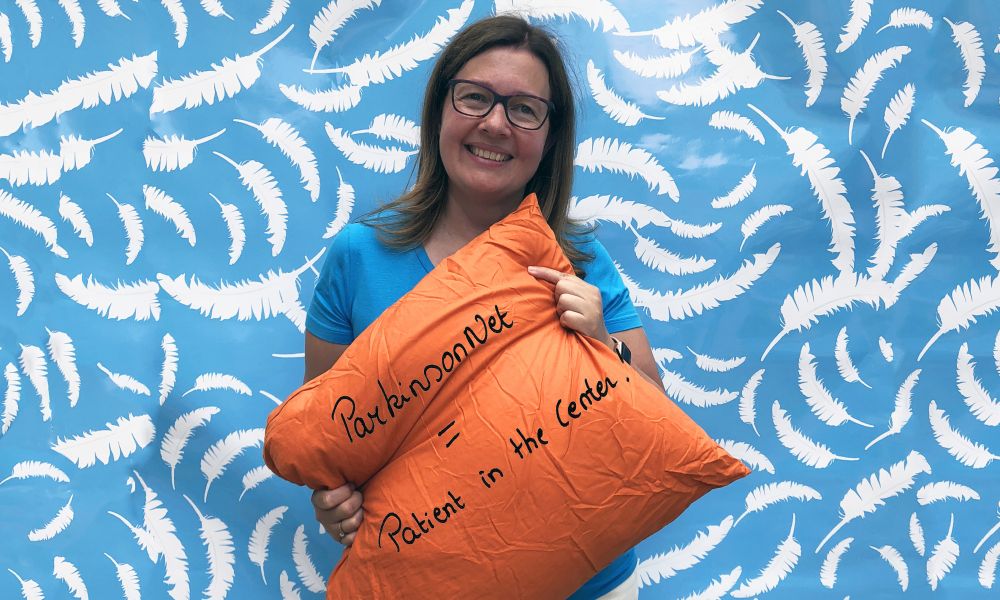What is occupational therapy and how is it useful for everyday life with Parkinson's disease?
An occupational therapist works in three areas of daily life - home, hobbies and work - to help people continue to do the things they care about. We work in partnership with those concerned, in order to identify problems and find concrete solutions, taking into account their habits and environment. It often involves adapting the space or organizing a task, in order to improve efficiency, and to reduce or eliminate disability situations. We help people maintain their independence where it is most important for them. These are called "meaningful activities" – activities that somebody really wants to do. This is where the occupational therapist will be helpful.
To give a few concrete examples – at home, it can be about finding easy ways to get dressed or go to the toilet. In the case of hobbies, an occupational therapist can suggest ways to adapt an already practiced hobby – or even propose a completely new one. At work, we focus on technical recommendations – changing the keyboard, the screen or the chair – or on adapting tasks that have become difficult. If a secretary cannot answer the phone anymore, one can recommend that he/she uses a recording device, for example.
We are working with people of all ages, from children having difficulties at school, to adults that have suffered from trauma or neurological problems. Each time there are solutions adapt to each individual. In the case of Parkinson’s disease, the most important is managing the fatigue. It’s important that people with Parkinson’s disease know how to choose and schedule the things they want to do. And sometimes accept that they should delegate them to somebody else. For example, if for you it’s important to do the cooking all by yourself, we can suggest having in-home care to help you with taking a shower and dressing, so that you can preserve your energy for cooking. For people with Parkinson’s disease, taking initiative is sometimes difficult. Thus, it’s important to think of simplifying the tasks, split them and organise them in an easy way. It’s important to relearn how to plan in a different, adapted way. The follow-up at home is essential as well, to put the solutions into practice, in the environment specific to the individual, and to make sure that he/she uses them well in his/her daily life.
The occupational therapist will also work with the caregiver, often the spouse, to assess their feelings about the burden of caring, and accompany them so that they don’t neglect their personal life. Finally, occupational therapy will be useful at different stages of the disease. Initially, this will be for tips on maintaining the activities, while at a very advanced stage, one will focus on the facilities to maximize the comfort and well being of the person concerned.
How do your interactions with the patients go?
I start with a first visit to find out what the difficulties are and make different suggestions. It may be advice on helpful technical tools or rather organizational coaching. Afterwards, it is up to the person to test the proposed solutions. Improvements can be time consuming and require the patient’s investment for implementation.
I work both independently and at a rehabilitation centre (Rehazenter). The type of follow-up therefore depends on the context. In the rehabilitation centre, appointments are regular and the exercises are done in the therapy room, but only during the hospitalization. For people I see outside of this, I can visit them at home or at work, more or less often. A very regular follow-up is not necessary, and it is not always feasible at the practical or financial level. In Luxembourg, occupational therapy is not reimbursed; so long-term follow-up often represents a significant financial burden for patients. I try to work by taking this into account.
The ideal solution would be to have a similar format like in the Netherlands where ten hours per year for each patient are reimbursed. This allows a first appointment to set up solutions, then episodic visits to check that things are progressing and propose new adaptations if necessary.
What are the benefits of the ParkinsonNet Luxembourg network, of which you are part?
Having had the opportunity to participate in the trainings, I know that this networks brings new know-how and changes your look. My approach is different now and I am more attentive. I work with the patient on the issues that bother them the most and not on the issues that I think are most important.
Physicians are also more aware of the importance of multidisciplinary care and prescribe more often occupational therapy to their Parkinson's patients. They also have a better understanding of our work and what sets us apart from other professions. ParkinsonNet also improves communication between health professionals. We can more easily be updated on our progress with a patient and help each other when something is not working
Another concrete aspect is that, if ParkinsonNet Luxembourg is recognized as a so-called network of competences, all the health professions involved in it will normally benefit from the same visibility and conditions. This would eventually allow occupational therapy consultations to be reimbursed. It would really be a step forward to open access to care for all!
To learn more about ParkinsonNet Luxembourg!





